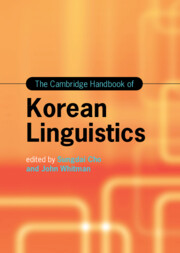Book contents
- The Cambridge Handbook of Korean Linguistics
- Cambridge Handbooks in Language and Linguistics
- The Cambridge Handbook of Korean Linguistics
- Copyright page
- Contents
- Figures
- Tables
- Contributors
- Preface
- Acknowledgments
- Abbreviations
- Part I Korean Overview
- Part II Phonetics and Phonology
- Part III Morphology and Syntax
- Chapter 12 Right-Dislocation in Korean: An Overview
- Chapter 13 Experimental Insights on the Grammar of Korean Anaphors
- Chapter 14 Person-Denoting Nominals: Interpretations and Structures
- Chapter 15 Lexical Nominalizations in Korean
- Chapter 16 The Processing of a Long-Distance Dependency in Korean: An Overview
- Part IV Semantics and Pragmatics
- Part V Sociolinguistics and Psycholinguistics
- Part VI Language Pedagogy
- Index
- References
Chapter 15 - Lexical Nominalizations in Korean
from Part III - Morphology and Syntax
Published online by Cambridge University Press: 30 September 2022
- The Cambridge Handbook of Korean Linguistics
- Cambridge Handbooks in Language and Linguistics
- The Cambridge Handbook of Korean Linguistics
- Copyright page
- Contents
- Figures
- Tables
- Contributors
- Preface
- Acknowledgments
- Abbreviations
- Part I Korean Overview
- Part II Phonetics and Phonology
- Part III Morphology and Syntax
- Chapter 12 Right-Dislocation in Korean: An Overview
- Chapter 13 Experimental Insights on the Grammar of Korean Anaphors
- Chapter 14 Person-Denoting Nominals: Interpretations and Structures
- Chapter 15 Lexical Nominalizations in Korean
- Chapter 16 The Processing of a Long-Distance Dependency in Korean: An Overview
- Part IV Semantics and Pragmatics
- Part V Sociolinguistics and Psycholinguistics
- Part VI Language Pedagogy
- Index
- References
Summary
Chapter 15 investigates the feasibility of an all-syntax approach to lexical nominalizations in Korean. In addition to productive syntactic nominalizations, Korean possesses a rich inventory of deverbal, i.e., lexical, nominalizations. The consensus in the field since the advent of the Lexicalist Hypothesis (Chomsky 1970) that syntactic and lexical nominalizations are formed in different grammatical components has been questioned in recent approaches that advocate a unified syntactic analysis of all nominalizations. The investigation reveals that while there are lexical nominalizations that are argument-bearing, previous arguments purporting to support separation of complex event nominals and simple event, or result, nominals, ultimately do not go through in Korean. Examination of a class of lexical nominalizations that bear some hallmarks of syntactic derivation leads to the same conclusion. Thus, deverbal lexical nominalizations in Korean do not support the kind of unified syntactic analysis of nominalizations that is currently dominant in the literature.
Keywords
- Type
- Chapter
- Information
- The Cambridge Handbook of Korean Linguistics , pp. 429 - 457Publisher: Cambridge University PressPrint publication year: 2022

